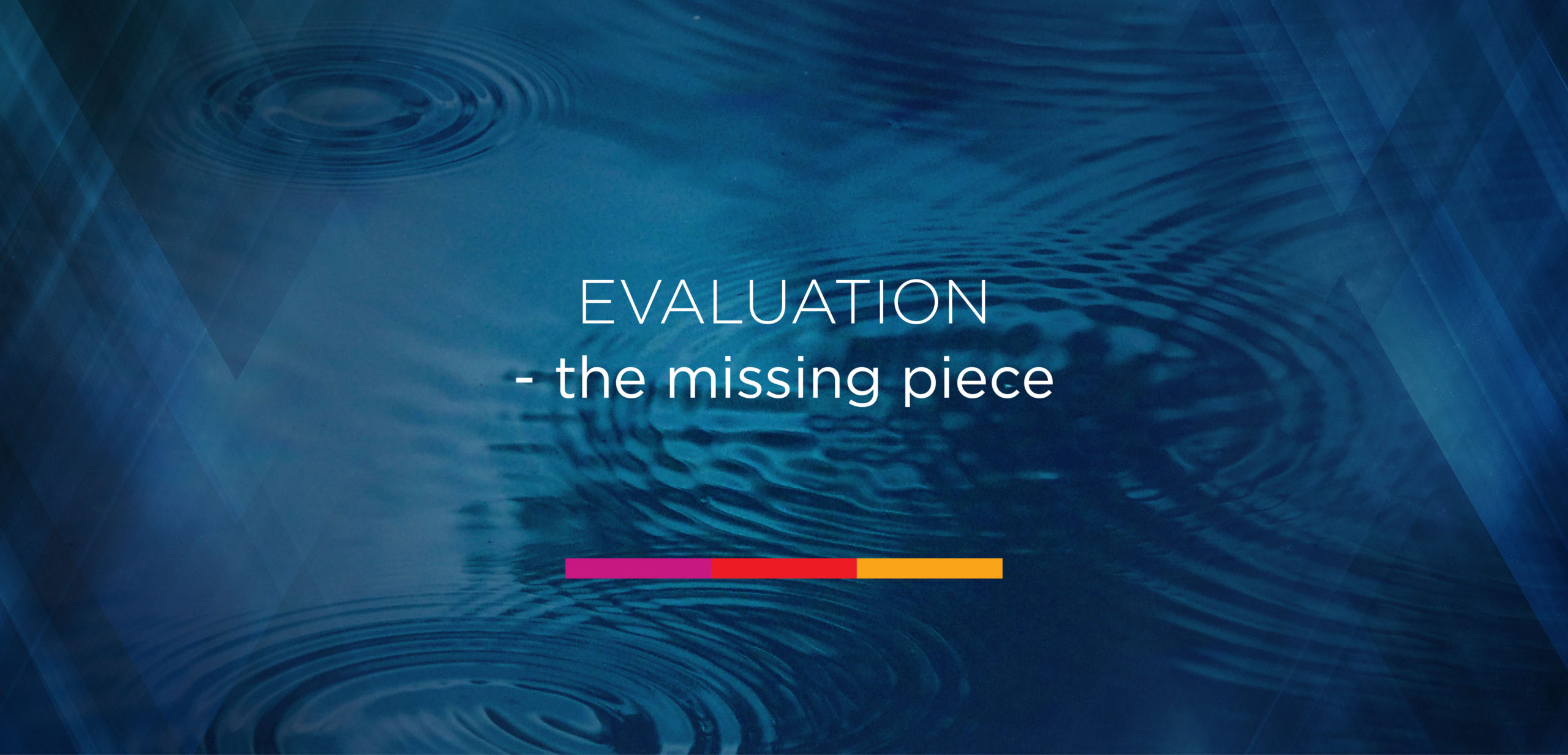By Neil Hart
After analysing the data from several ministry organisations who participated in the Mergon Foundation’s Organisational Self-Perception (OSP) Scan (see more here) over the past two years, we are starting to see important patterns emerge relating to the organisational health of ministries.
We have observed that of the 11 dimensions of organisational health, the areas of financial sustainability and evaluation appear to be the most-underdeveloped. Though financial sustainability is an important topic which we’ll discuss in future, in this article, we will focus on the latter, namely evaluation.
Evaluation is one of the surest ways to know if an organisation’s strategy is solid. If an organisation is weak on evaluation, it puts a big question mark on strategy.
Evaluation impacts strategy, strategy impacts operations
Effective evaluation directly impacts how we think about our strategy. This is typically referred to as our ‘theory of change’. A theory of change is an organisation’s description of why their particular strategy or way of working will be effective. Importantly, a theory of change indicates how change happens in the short, medium and long term to achieve the desired impact. In other words, if we do ‘this’ (e.g. run a particular programme, change an approach or strategy etc.), then that (e.g. a systems change, a mindset change, social behaviour change) will happen. If ‘that’ happens, then the desired transformative action happens on the ground. It’s crucial for non-profits to have a clearly articulated strategy connected to actual change to help them understand what is needed to shift both the current and desired narrative of the people they serve.
Strategy then determines our operations – that is, strategy determines what we build and operations determines how we build it. If we are not evaluating our work thoroughly, what we build may be less effective and have less impact than we had anticipated. Of course, what we build will directly impact the culture of our organisations, so it’s important that we gauge our operations in light of our people impact too.
Because evaluation directly impacts strategy and strategy directly impacts operations, it is critical that we get better at evaluation.
How to improve evaluation
Let’s take a closer look at what it takes to improve our evaluation.
Design thinking is a popular trend today. It brings a human-centered approach to innovation – one that helps us to systematically extract, learn and apply these techniques to solve problems in a creative way. Design thinking is an iterative process that requires layers of experimentation, as the designer is willing to challenge assumptions and discard conventionality in the attempt to understand, and meet, the user’s needs.
Recently I met with the leader of a great organisation who works on leadership development in order to transform communities across Africa. Their focus, for over a decade, had been on the number of leaders trained, based on an assumption about how that would transform communities that these leaders lived in. In the past year they started asking deeper questions in the communities, and as a result of learnings and challenging their own assumptions, they made a fundamental shift to use indicators of community transformation as their key measures, not leaders trained. This is a great example of evaluation and design thinking directly influencing strategy.
Very often organisations are formed out of the best intentions of founders, but not always with the best view of what is needed by people on the ground. We are all simply too influenced by our own worldview to be able to truly understand the worldview of others. Most leaders will be able to articulate a ‘good enough’ solution for what is needed in an environment, but ‘good enough’ is unfortunately not enough to deeply transform environments. However, when we take regular time to be curious, to ask searching questions, when we are brave enough to ask the tough questions of our work, we sometimes find surprising answers.
At Mergon we developed an evaluation grid for ourselves that uses four key components of our mission – Strategy, Stewardship, Servanthood and Catalytic – to assess whether our collective effort is yielding results.
We ask four constituents a range of qualitative and quantitative questions: firstly we ask those we serve – our ministry partners, secondly we ask our board, thirdly we ask our team, and lastly we ask our data (gathered on multiple points over 12 months). From these inputs we compile a report that we take a week to work through, reflect on and utilise the insights to re-evaluate and inform our strategy for the following year.
Evaluation can be complex but it can also be a simple, intuitive process that keeps us ‘on the ground’ long enough to ask all the right questions and process that information regularly to ensure that our work bears fruit.
Our encouragement to you is this: Be inquisitive. Ask the tough questions. Create a culture of honest feedback from beneficiaries or customers, or from the people in the environment into which you are embedded. Build rhythms into your year where you workshop findings and assess how this should impact your strategy. With an ongoing commitment to evaluation, we can ensure that our purpose is fulfilled and on track to leave a stable foundation for the next generation to build on.
Please refer to our previous articles for more information on this topic:
- What is organisational health and why does it matter?
- The physics of organisational health
- Understanding and evaluating perception: the key to organisational health
- 11 Dimensions of organisational health
- Organisational life stages and organisational health
All rights reserved. Copyright 2018 Mergon Group.
